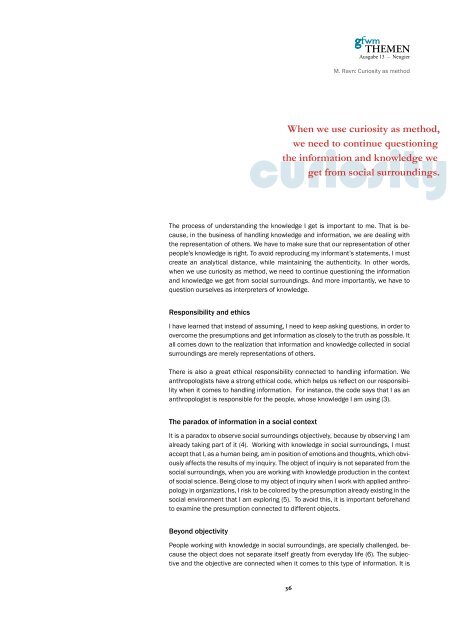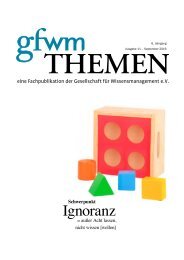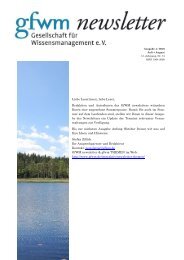gfwmTHEMEN13-Neugier
Sie wollen auch ein ePaper? Erhöhen Sie die Reichweite Ihrer Titel.
YUMPU macht aus Druck-PDFs automatisch weboptimierte ePaper, die Google liebt.
Ausgabe 13 – <strong>Neugier</strong><br />
eine Fachpublikation der Gesellschaft für Wissensmanagement e.V.<br />
M. Ravn: Curiosity as method<br />
When we use curiosity as method,<br />
we need to continue questioning<br />
curiosity<br />
the information and knowledge we<br />
get from social surroundings.<br />
The process of understanding the knowledge I get is important to me. That is because,<br />
in the business of handling knowledge and information, we are dealing with<br />
the representation of others. We have to make sure that our representation of other<br />
people’s knowledge is right. To avoid reproducing my informant’s statements, I must<br />
create an analytical distance, while maintaining the authenticity. In other words,<br />
when we use curiosity as method, we need to continue questioning the information<br />
and knowledge we get from social surroundings. And more importantly, we have to<br />
question ourselves as interpreters of knowledge.<br />
Responsibility and ethics<br />
I have learned that instead of assuming, I need to keep asking questions, in order to<br />
overcome the presumptions and get information as closely to the truth as possible. It<br />
all comes down to the realization that information and knowledge collected in social<br />
surroundings are merely representations of others.<br />
There is also a great ethical responsibility connected to handling information. We<br />
anthropologists have a strong ethical code, which helps us reflect on our responsibility<br />
when it comes to handling information. For instance, the code says that I as an<br />
anthropologist is responsible for the people, whose knowledge I am using (3).<br />
The paradox of information in a social context<br />
It is a paradox to observe social surroundings objectively, because by observing I am<br />
already taking part of it (4). Working with knowledge in social surroundings, I must<br />
accept that I, as a human being, am in position of emotions and thoughts, which obviously<br />
affects the results of my inquiry. The object of inquiry is not separated from the<br />
social surroundings, when you are working with knowledge production in the context<br />
of social science. Being close to my object of inquiry when I work with applied anthropology<br />
in organizations, I risk to be colored by the presumption already existing in the<br />
social environment that I am exploring (5). To avoid this, it is important beforehand<br />
to examine the presumption connected to different objects.<br />
Beyond objectivity<br />
People working with knowledge in social surroundings, are specially challenged, because<br />
the object does not separate itself greatly from everyday life (6). The subjective<br />
and the objective are connected when it comes to this type of information. It is<br />
36










